
Background
In early 2024, a major air cargo operator reached out to Osprey to better understand the use of air cargo by organised crime groups (OCGs) in Latin America, particularly their methods, including goods most used to conceal illicit items, preferred routes and the airlines affected. Osprey frequently reports on OCG use of air cargo to smuggle various types of illicit goods, including but not limited to narcotics, weapons and precious metals (particularly gold). While criminals target air cargo primarily at airports and their warehouses, cargo staff have also fallen victim to robberies and carjackings.
To support the aviation industry and help mitigate the risks posed by organised crime, Osprey Flight Solutions has collected data and issued numerous post-incident alerts on the seizure of illicit goods, including narcotics, at airport warehouses and from aircraft, as well as the facilitation of such activity by corrupt aviation employees and robberies affecting cargo staff.

The Rising Importance of Air Cargo for OCGs Since the Pandemic
The methods used by OCGs to exploit air cargo and the frequency with which they do so have evolved since the global COVID-19 pandemic. This is particularly true of narcotics trafficking. As highlighted by the United Nations Office on Drugs and Crime (UNODC), the seizure of cocaine and other illicit substances at air, sea and land terminals grew during 2020, despite the difficulties associated with the pandemic.
Extent and Methodology
Osprey has identified various methods used by OCGs to smuggle their goods by air cargo, including the contamination of legal shipments, sometimes with the aid of corrupt airport staff.
Contamination of legal shipments (also known as the ‘rip off’ method)
On 30 July 2023, anti-narcotics police at Gustavo Rojas Pinilla International Airport (SKSP/ADZ), serving San Andres Island, Colombia, found 1.5 tonnes of cocaine inside a shipment of 57 cardboard boxes containing vegetables and apples, bound for the US, inside a cargo aircraft. The shipment had originated from Cali Airport (SKCL/CLO), also in Colombia. Officials had received an alert from authorities in Bogota who raised concerns about inconsistencies in the documentation of the shipment.
Crime groups often conceal illicit merchandise beneath a false bottom inside the container of a legal shipment. This method was used in October 2023 during an attempt to transport 274g of cocaine inside a shipment of documents bound for the US from La Aurora International Airport (MGGT/GUA), Guatemala.
Use of shipping fronts
On 15 July 2023, in Colombia, a security operation resulted in the dismantling of a drug-trafficking group that smuggled cocaine to the US, Mexico, Spain, Belgium and the Netherlands by air and sea, including via Bogota Airport (SKBO/BOG). To evade suspicion, the group established legal export companies and hid the drugs inside shipments, which usually contained charcoal, organic fertiliser or coffee to evade controls.
In another example, in April 2023 in Brazil, following the launch of ‘Operation Itamara’ - aimed at dismantling a criminal organisation that was illegally exporting illicitly mined precious stones, including via airports - media reporting stated that the group had a number of front companies, which they would use to facilitate the shipment of stones and gold using false invoices and other documents.
Corruption
In June 2023, Bolivian officials began investigating 13 people - including a range of airport workers - in relation to the seizure of 478kg of cocaine from a shipment in the hold of a flight at Madrid Airport (LEMD/MAD), Spain, that had departed from Viru Viru International Airport (SLVR/VVI) in February 2023. Over the course of several days, various arrests were made, including those of two employees of Boliviana de Aviacion (BoA), the head of the Special Force to Fight Drug Trafficking (FELCN), a civil aviation security officer and a customs worker, all at Viru Viru Airport. Two high-ranking officials from BoA and Bolivian Air Navigation and Airports (Naabol) were dismissed, along with 13 FELCN officers. The investigation revealed that the seals of the shipment at Viru Viru Airport had been violated, enabling the suspects to introduce the cocaine. Review of CCTV at Viru Viru showed that the narcotics were placed in a container in a restricted area.
Osprey has recorded several other incidents, including the below cases in Ecuador (left) and Brazil (centre & right):
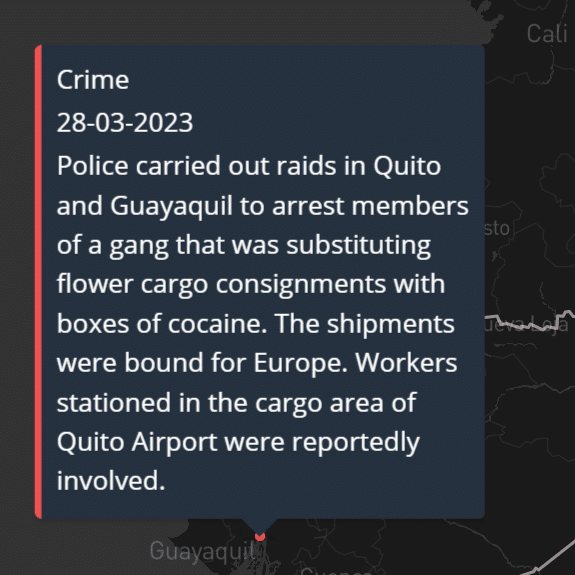
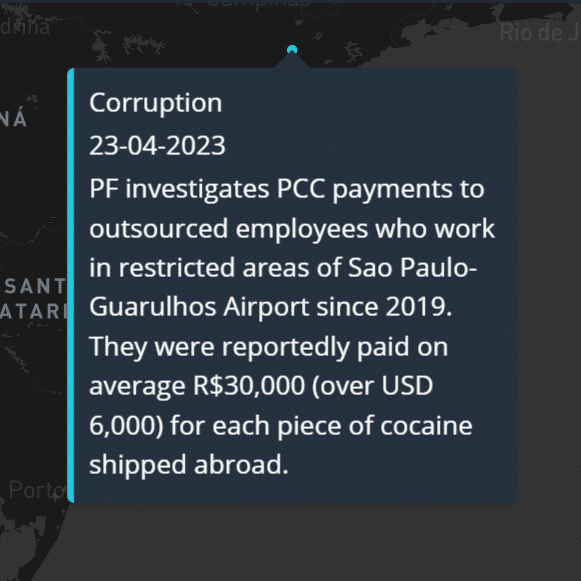
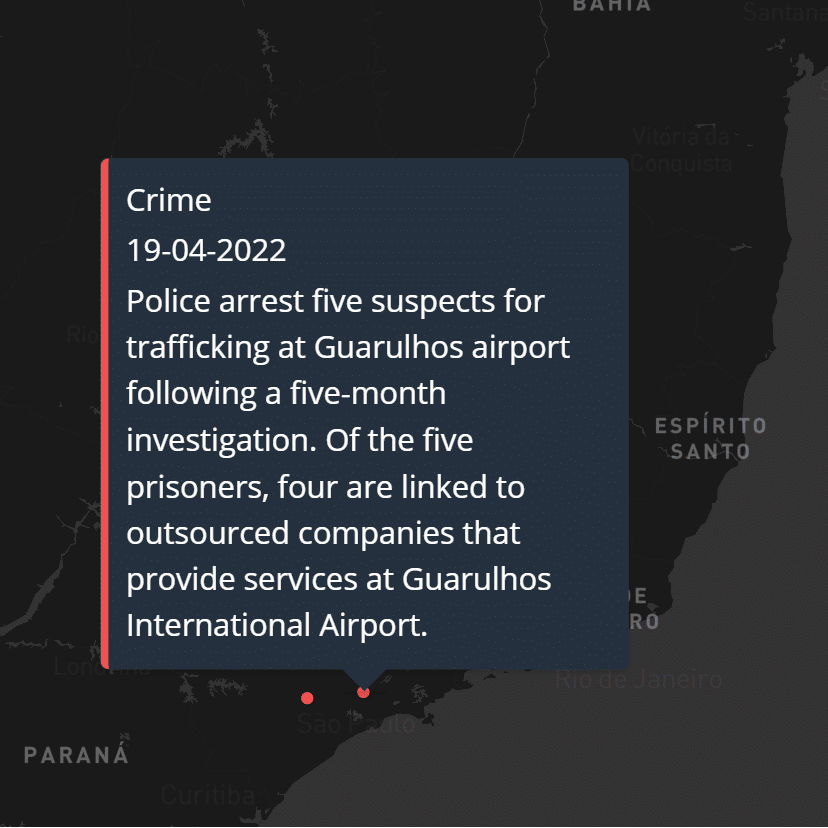
Osprey:Explore maps showing locations of incidents involving corrupt aviation workers
Infiltration
In July 2022, the Brazilian Federal Police launched 'Operation Bulk' to target a criminal organisation that had recruited airport employees to smuggle drugs to Europe via commercial aircraft. Authorities arrested around 15 people, including airport employees, suspected of belonging to the First Capital Command (PCC), a Brazilian gang. The investigation revealed that while the group recruited aviation employees to work for it, some of the group members had also reportedly obtained jobs with airport service providers with the objective of facilitating drug shipments.
Preferred Routes
Illegal weapons and ammunition are frequently sent from Miami, Florida, to airports in Colombia, Chile and Brazil. Marijuana is also often smuggled from Miami to Paraguay. Other narcotics are commonly sent from Brazil to African nations via Portugal, from Colombia/Ecuador/Peru/Bolivia to Spain primarily, in addition to France, Belgium and the Netherlands. Seizures are also frequently conducted at San Andres Island Airport in Colombia from shipments bound for the US.
Preferred Concealment Methods
OCGs conceal illicit goods and substances among various types of legitimate shipments, primarily food products, including agricultural products and frozen fish, fertilizer and coffee, statues/sculptures and electronic goods, such as motorcycle batteries, welding machines and printers (see examples below).
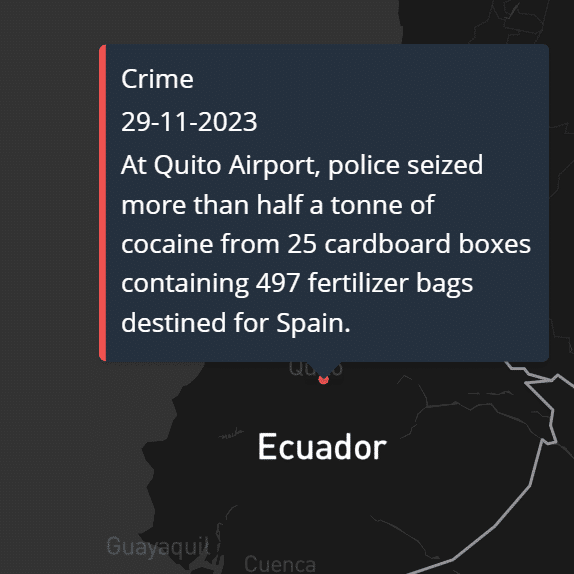
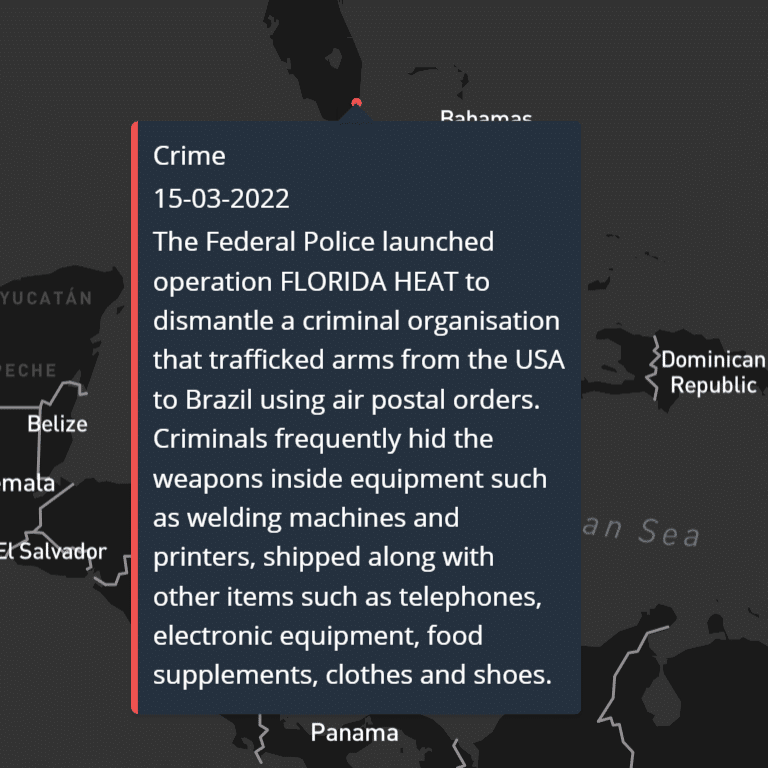
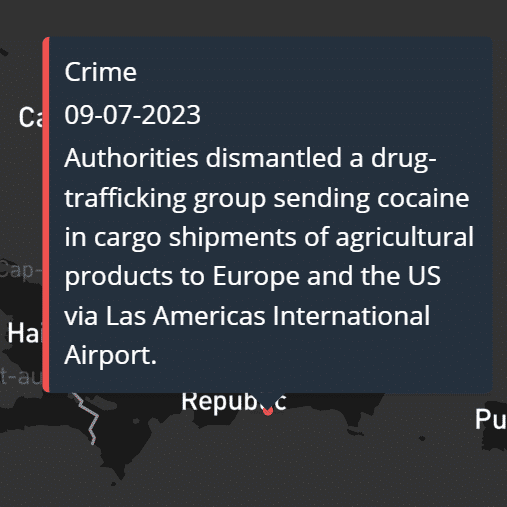
Osprey:Explore maps showing locations of incidents involving illicit substances and weapons being trafficked via cargo operations
Security Risks to Staff
The presence of OCGs at/near airports in Latin America further poses direct physical security risks to staff. Osprey has recorded several robberies, either at airport warehouses or targeting cargo trucks exiting airport terminals, primarily in Paraguay, Brazil, Mexico and Ecuador. Most recently, in Paraguay on 19 January, six to ten armed individuals travelling in two to four vehicles hijacked a cargo truck carrying electronic products (mostly mobile phones) as it exited Asuncion Airport (SGAS/ASU) and took its three occupants temporarily hostage. The incident occurred eight blocks from the eastern boundary of the facility. The truck was found a short distance from the site of the hijacking; several items were missing from its cargo. The National Police reportedly stated that the criminals were most likely aware of the itinerary of the cargo truck, which they targeted specifically. Two other similar incidents occurred in 2023.
In mid January, a national investigative media report stated that violence and related crime, including extortion and robberies, in several municipalities of the State of Mexico surrounding Felipe Angeles International Airport (MMSM/NLU), serving Mexico City, had risen since 2019 – coinciding with the beginning of the construction of the new airport. Criminals in Latin America are usually armed, and some of these robberies have escalated and resulted in fatalities. On 29 October, in Guayaquil, Ecuador, a group of armed individuals attempted to rob an armoured vehicle in the international cargo area of the city's airport (SEGU/GYE), resulting in the death of a private security guard. The truck was transporting gold bars.
Outlook
According to the UNODC, "only 2% of containers that travel around the world by air, sea, roads and railways are adequately inspected for the detection of illegal acts". In addition, OCGs are particularly attracted by air cargo due to its expediency and because it enables them to conceal large quantities of illicit substances. As such, given the difficulties in inspecting each piece of cargo, OCGs will continue their activities exploiting air cargo worldwide. The risk exposure of cargo operators will be especially high in locations where criminality levels are elevated, particularly Latin America. Osprey will continue to monitor levels of aviation-related criminal activity and corruption worldwide and provide up-to-date, detailed information and advice through our Analyst Updates and Osprey:Explore.







